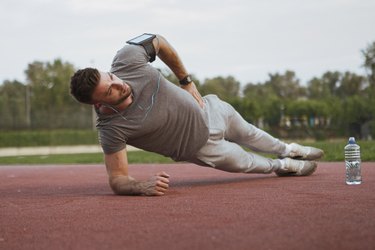
Being an athlete of any level is no easy feat. Regardless of if you just started out in your chosen sport or activity or you've been at it for 40 years, there will inevitably be times where you feel stuck in your routine or like you're not progressing how you think you should be. Maybe you're having trouble mentally coming back from a serious injury or maybe you're anxious about an upcoming race or game.
To help with all that — and more — that's where a sports psychologist comes in.
Video of the Day
Video of the Day
A sports psychologist can be a daunting term, perhaps one reserved for elite athletes or performers. But a sports psychologist, specifically a certified mental performance consultant (CMPC), is trained to help clients achieve their goals in performance of any kind, explains Jamie Shapiro, PhD, CMPC, a professor at the University of Denver and co-director of the school's master's in sport and performance psychology program.
Below, we dive into what sports psychologists do, how they can help you throughout your fitness journey and how to find one that fits your needs.
What Is a Sports Psychologist and What Do They Do?
In the simplest terms, a sports psychologist — specifically a certified mental performance consultant (CMPC) — will help people implement strategies to achieve performance goals.
Shapiro explains that the core of what these specialists do is teach mental skills that address certain areas, including motivation, goal-setting, arousal regulation (increasing energy if you're feeling low), relaxation, performance anxiety, improving confidence, recovering from injury and addressing group dynamics.
Shapiro is careful with the term "sports psychologist," explaining that professionals who work with people on issues like performance anxiety, stress management and negative self-talk are not usually clinical psychologists. (Legally, in the United States, you cannot call yourself a psychologist unless you are a licensed psychologist.)
"A mental performance consultant will work with someone who does not need clinical psychology," Shapiro tells LIVESTRONG.com. (However, it's worth noting that the behaviors sports psychologists help with could be a part of therapy work with a clinical psychologist, too.)
Someone who is a clinical psychologist with the word "sports" in front, she says, might work with athletes or have an interest in sports, but they're not focused on sports or exercise performance.
In other words, if you're looking for a sports psychologist, a CMPC is the gold standard certification, explains Amber Shipherd, PhD, CMPC, associate professor and exercise science/performance psychology program coordinator at Texas A&M University at Kingsville.
Do I Need A Sports Psychologist?
Sports psychologists are often associated with elite-level athletes or performers because their livelihood is based on performance, Shapiro says. But anyone who is struggling with mental blocks when it comes to performance — athletic or otherwise — can benefit from working with a trained consultant.
Let's say you're struggling with completing workouts or don't feel like lacing up your shoes for a run (unsurprisingly, a lack of motivation is associated with low levels of exercise, according to an October 2015 review in Health Education Research). A performance consultant can work with you to articulate goals — to give you something to work toward — Shapiro says.
In many cases, a barrier to performance is self-doubt, which is linked to negative self-talk. This is pervasive, especially when it comes to any type of fitness or athletic performance. For instance, a March 2022 study in PLOS One that looked at more than 250 young gymnasts found that positive self-talk lead to better performance while negative self-talk lead to a poorer outcome.
"Anxiety about a race, for example, can inhibit your performance and training," Shapiro says.
Another common barrier to performance or progress in athletes and general exercisers, Shipherd says, is returning from injury.
"Individuals who've had one injury, any sort of nagging pain or indication that something doesn't feel right, increases the fear of re-injury," she says. "A lot of times it boils down to what's causing that fear, and often, it's confidence-related."
But you don't need to be worried about failing to perform to benefit from seeing a sports psychologist.
"We try to dispel the myth that something has to be wrong in order to work with a [sports psychologist]," she says.
Shapiro says that a sports psychologist can be just another team member you work with for support, alongside a massage therapist, a registered dietitian and a coach, for example.
Key Takeaways From a Sports Psychologist
Like physical therapists and mental health professionals, it's hard for sports psychologists to make blanket recommendations because every person has unique challenges and preferred ways to cope.
That said, Shapiro says many of her clients struggle with things like focus and negative self-talk. Shipherd says people might feel stuck in a routine or lack motivation because of a fear of perceived failure.
In these examples, there are certain mental techniques sports psychologists and their clients can practice, all of which start with awareness, Shapiro explains.
"The first step is awareness of what is my mind doing," she says. "The mind wanders, that's what it wants to do. It's important to develop mindfulness — paying attention to what you're paying attention to."
That mindfulness practice can help people focus on the present during their lifting session or track workout, for instance.
A June 2019 study in the Journal of Functional Morphology and Kinesiology found that exercisers who used a mental warm-up, which included goal-setting, imagery, confidence-building, arousal regulation and attentional focus, were better ready to exercise and employ mental strategies to enhance their workouts. The researchers also found that these mental warm-ups reduced overall stress in the college participants.
Sports psychologists often use imagery, which is more encompassing than just visualization.
"Imagery uses all of the senses," Shapiro says.
Another tactic Shapiro recommends is using cue words that allow her clients to return to the present moment — a common practice in mindfulness.
"It might take a million times [for cue words to bring you back to the present], but the more you train that mental training, the more it becomes automatic," Shapiro says.
She gives the example of a gymnast who might use the word "push" or "toes" while she's on a balance beam.
For exercisers or athletes who are struggling to find motivation, Shipherd says they might benefit from setting a goal, like training for a 5K or trying a new exercise move at the gym. Another way to improve motivation, she says, is to find the fun in your activity.
"Maybe you don't need a target or a goal. Maybe you're not enjoying what you're doing," she says. "Try something different. If you're a regular runner, take up hiking or cycling."
How to Find a Sports Psychologist
Now that you know what to look for — a CMPC — it can be easier to dig through internet search results when trying to find a sports psychologist near you.
Shapiro and Shipherd recommend using the directory from the Association for Applied Sport Psychology. This is organization that created the CMPC certification, which is the gold standard for sports psychologists.
If you've found a practitioner who does not have the CMPC certification, Shipherd recommends looking at their backgrounds.
"I see a lot of people who are 'wellness coaches,' but those are certifications right off the internet," she says. "You want someone who at least has degrees in a related area."
One related area, she says, might be kinesiology, which is the study of the body's movement.
Sports psychologists can be expensive. Shapiro acknowledges that although anyone can benefit from using one, it's often wealthier people who can afford them.
"Part of the challenge is funding," she says. "I think [sports psychology] is necessary, but it's seen as a luxury."
Shapiro says that at the University of Denver, where she works, her team tries to provide services for people who otherwise wouldn't have access. This might include pro bono work, sliding scale fees and sending teams to lower-income communities and their schools.
Shipherd recommends people contact graduate programs near where they live, which often use students in the program to practice in the field at a discounted rate.
- American Psychological Association: "Defining the Practice of Sport and Performance Psychology"
- PLoS One: "Positive and negative spontaneous self-talk and performance in gymnastics: The role of contextual, personal and situational factors"
- Journal of Functional Morphology and Kinesiology: "Effects of a Mental Warmup on the Workout Readiness and Stress of College Student Exercisers"
- Health Education Research: "Adolescents' perspectives on the barriers and facilitators of physical activity: a systematic review of qualitative studies"
- Association for Applied Sport Psychology: "Find a Certified Mental Performance Consultant"


